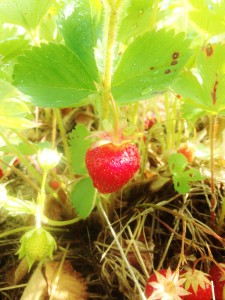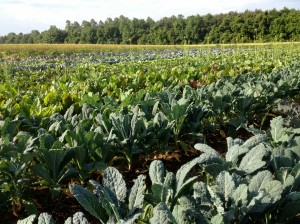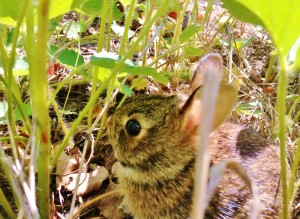I am going to tell you two important things about organic strawberries.

This could be a perfect strawberry, except there is no spider.
The first thing I am going to tell you about organic strawberries is that all of the world’s most beautiful, most miraculous, most perfect strawberries are guarded by giant spiders.
The spiders don’t eat the strawberries. The only reason I can imagine they want them is because the beautiful, miraculous, perfect strawberries attract bugs, which the spiders then eat. They use the strawberries as some kind of horribly cruel and deadly tempting bait.
Either that, or they’re like dragons with a hoard of gold. They can’t do anything with their bounty. They just like taking it away from other people because it’s in their nature to be mean spirited. And it’s shiny.
Conventionally grown strawberries probably don’t have this problem because people douse them in chemical pesticides. But then again, there is no such thing as a beautiful, miraculous, perfect strawberry that has been doused in pesticides. So the point is mute.
Either way, if your little red berry is not protected by a monstrous, shudder-inducing eight-legged creature from the realm of nightmares, you’re probably not looking at a berry worth its straw.
Or you just haven’t seen it yet.
—————————————————————————————————————————————————————–
I started working on the farm because the farmer was the professor for a class on sustainable agriculture I had taken that spring. I had come out to his farm once every week for 3 hours to work, and I liked it. I needed a part-time summer job, and I wanted something that fulfilled my sense of who I wanted to be and what I wanted to stand for.
Also, every time I went out there, I got some free produce for my work. If there’s one thing I’ve learned in college, it’s to never say no to free food. (Most especially locally, sustainably grown free food.)
So I called the farmer up one Monday morning and asked, “Hey Charlie, are you looking for any part-time workers?” And he said, “Actually, I am. Can you come out this afternoon?”
And so it began.
The first day I picked strawberries. I had only picked strawberries once before, when my mother and I went to a pick-your-own patch. That time, when I saw spiders, I was free to give them a wide berth and pick spider-free strawberries. Working at the farm, I didn’t have such a luxury. Every ripe strawberry was to be picked.
I should explain that I have an irrational, unshakable, fundamental fear of spiders. I know there are only two kinds of spiders in my area that are poisonous, and I can identify them. The irrational part is that even if I know the eight-legged thing in front of me isn’t poisonous, I don’t care. I want to run away and scream and cry like a three-year-old. I can’t help it. I’ve tried to get over my fear, because obviously it’s pretty inconvenient to have such an extreme aversion to spiders when you like to do things outdoors. In my defense, I’m not afraid of other bugs, snakes, lizards, frogs, mice, or, well, anything else. Just spiders.
The spiders, of course, didn’t go away. But neither did I.
I could have quit my job at the farm. I seriously considered it on the days when I was picking lettuce, which spiders also like. There were sometimes so many spiders under a head of lettuce that when I saw them, I was paralyzed with terror. Here I was, so afraid of spiders that sometimes it literally rendered me motionless, working in a place where there were spiders everywhere: in the strawberries, in the lettuce, in the sugar snap peas, in the kale, in the squash. So why didn’t I quit?
Because the tiny rational part of my brain knew that spiders are an important part of a healthy eco-system. They have a role to play on the farm, just like I do. (That role is to eat all the bugs that would eat the plants.) I could easily be working on a farm that used pesticides, and I wouldn’t have to face spiders. But that’s not the world I want to live in: a world where I trade the things that scare me for dangerous, unhealthy, unsustainable comfort.

Fields of kale. And other green things. And spiders.
There’s nothing wrong with being scared by the things we have to face, whether they’re spiders or the uncertainty of the future. I learned that there are definitely going to be times when you’re so frightened you feel like you can’t move, can’t do anything.
I wish I could say that my time on the farm cured me of my fear of spiders. But that would be a lie. It’s not “getting over” fears that’s important. It’s moving forward despite them, even if it’s a little slower, a little more cautiously.
Taking sustainable steps, changing the way you live—it can be scary. Not knowing what’s going to happen next—terrifying. Facing our world’s biggest problems and feeling like you don’t know enough or don’t have enough power to really make a difference—shudder inducing.
But I urge you to do it anyway. The rewards are worth it, I promise.
—————————————————————————————————————————————————————–
The second thing I’m going to tell you about organic strawberries is that if you want one of the world’s most beautiful, most miraculous, most perfect strawberries, you need to pick it yourself.

Guess who else likes organic strawberries?
This is not because strawberries taste the best when they are at their freshest, straight off the plant and into your mouth (though this is true).
This is not because it is more satisfying to fight against the spiders yourself and reap the benefits of your own courage and determination (though this is also true).
It is because you will never get this strawberry in the little bin of strawberries you buy from the farmer. You cannot buy this strawberry. Whoever picked that bin has already eaten the strawberry.
And can you really blame them? After all, they fought a spider for it.
By Jessica Edington
